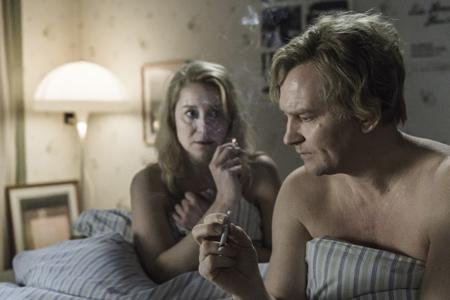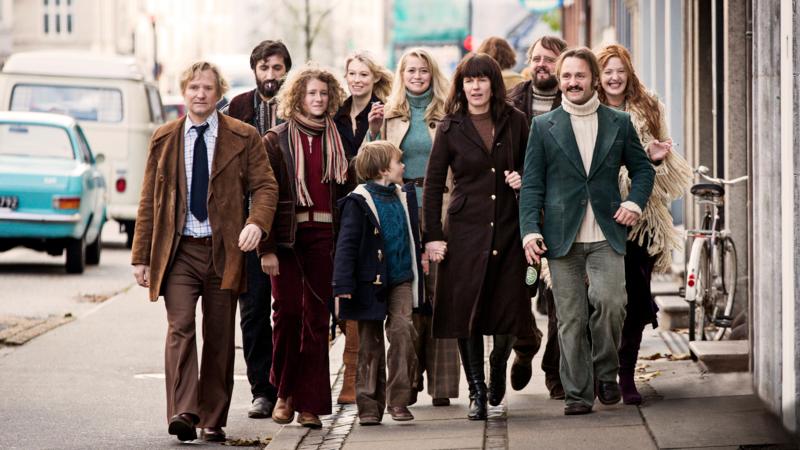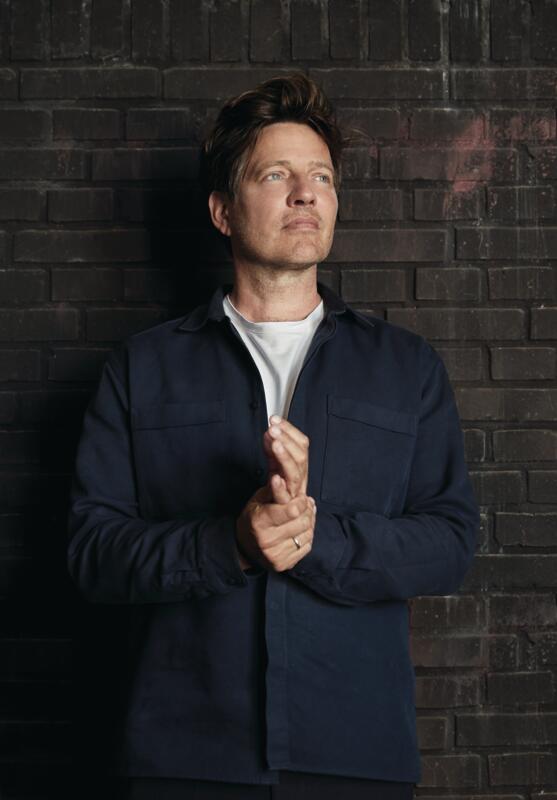Thomas Vinterberg never forgot what it felt like as a young teenager to have one of his sneakers destroyed for leaving it lying around the house.
It was no ordinary house or ordinary childhood. From age 7 to 19, Vinterberg lived in a communal home in North Copenhagen with his parents and a group of their intellectual friends. One of them hated personal effects left around the living room and burned one – tellingly, just one – of young Thomas' sneakers.
Such a memorable detail became part of Thomas Vinterberg's new film "The Commune." One of the characters burns the mess left around the house, and in the remains you can spot a single shoe. Vinterberg smiles at the memory. "That drove me crazy. One sneaker. The housemate thought, 'That's messy, I'll burn them.' But he's the kind of guy you forgave everything."
"The Commune" is easily Vinterberg's most personal film, but he insists it's not really his own story anymore. "It's definitely not autobiographical, as I'm saying it is 'based on a true feeling.' This is no longer my or my parents' story, but it mirrors an atmosphere of my childhood and I hope it's loyal to it."
The Commune Photo: Ole Kjelbye
Honest Portrait of the '70s
The project started life in 2011 as a stage play for the Vienna's Burgtheater. Then Vinterberg recruited Tobias Lindholm – his collaborator on "Submarino" (2010) and "The Hunt" (2013) – to co-write the film script, which he says differs quite a bit from the play, which is set entirely in one room of the house.
The story starts as Anna, a newscaster, her professor husband Erik and their young teenage daughter Freja are moving into a large house that Erik has inherited. Anna is looking for more from life, and she suggests they invite friends to share the house in communal living. She announces to her husband, "I need to hear someone else speak." But the reality isn't as idyllic as she hopes, and she has to accept her husband taking a younger lover, Emma.
It isn't an easy "free love" story, nor is it a mocking story of '70s hippies just hanging around. It's more a look at a wife and mother's world falling out from under her and her teenage daughter's sexual coming of age at the same time. The commune isn't actually the focus of the story, just the setting of the world in which this family undergoes big changes.
"Every film about communes is sort of a sellout of hippie ideals and they are looked upon in a way that's more like caricatures," says Vinterberg. "In this film I was trying to dig deeper and also defend it a bit more and make as honest a portrait of that time as possible. It's about the laughing, the love, the sense of togetherness and also the pain."
"In essence it's a story about how everybody is replaceable and how horrible that is to realise," he continues. "But by telling that story you emphasise how important love is to us, how endearing it is to us."
Children and their Grown-ups
The always-excellent Trine Dyrholm delivers one of her bravest performances as Anna. "It's about sharing a husband, sharing a house," Thomas Vinterberg says. "Anna, she carries that ambition more than anyone else. She tries to embrace her husband's urge to go somewhere else and that's what breaks her. She keeps trying until she gets insane and sort of recovers from that."
Freja and six-year-old Villads, the only two youngsters in the commune, provide an entry point into this world as well. "I was a kid back then and that was my entry door into my imagination and memory of those times," Vinterberg recalls. "I remember being more grown up back then than I am now, and I also remember the grown-ups being less grown up than the children … It was so stimulating to be amongst so many great academics. Yet at the same time, I could lose track of my parents amidst that. You had a lot of parents."
His own parents saw "The Commune" on stage in Vienna "and loved it. They smiled in moments because they could recognise stuff. But my parents are two lovable people. My dad is not like Erik at all," Vinterberg says with a grin. "What makes me more nervous is the rest of the commune seeing it. I've blended them all together, one character is a conglomerate of three different people, but no doubt they'll see shadows of themselves."
The Commune Photo: Henrik Petit
Shaping the Story
Vinterberg credits Tobias Lindholm in helping shape which memories to include and which communal clichés to exclude.
"We've created our own little fantasy commune. And Tobias moved in long ago," Vinterberg explains. Even though Vinterberg, 46, and Lindholm, 38, are of different generations they come from a similar storytelling approach. As Vinterberg says, "We're a team now."
"Tobias is the clarity that allows me to be messy. He's got the eye steady on the ball so I can bring out all the chaos around it. He liberates me." As they tackled the script, Vinterberg wanted to "try to recreate that sense of warmth and love and electricity that was around the table."
The tone of the film shifts as the story evolves. "The audience laughs a lot in the first hour and then they cry a lot, and that's exactly what I experienced in Vienna at the opening of the play," the director remembers. "This balance between humour and tragedy and reality has become something people call very much me.'"
He prepared the cast in three different ways. With the two younger actors, Sebastian Grønnegaard Milbrat who plays Villads and Martha Sofie Wallstrøm Hansen who plays Freja, he worked with casting "wizard" Jette Termann and says "She is a tough teacher, but they thoroughly enjoy it."
With Trine Dyrholm and Ulrich Thomsen, he had them meet for an intense 48 hours – "Erik and Anna had so much character on page already, they didn't need two weeks of workshop, it would have created impatience."
And then the whole commune "had to be such a lovable family" that they spent ten days in an inn together. "We did drinking and rehearsals and discussed the scenes. Finally, at the end, we had a two-hour dinner in character and costume. That was amazing."
Vinterberg's wife Helene Reingaard Neumann plays Emma, the younger lover who Erik brings into the house, and he was careful that they behaved as normal colleagues on the set. "It's important to us, but it's even more important to the colleagues so they can interfere and interact and have opinions and not treat us as a crystal vase," he remembers. "We had to treat it very professionally."
The Commune Photo: Ola Kjelbye
A Festen Reunion
"The Commune" is another kind of family reunion as well, as it brings together Vinterberg, Thomsen and Dyrholm for the first time since they collaborated on 1998's seminal "Festen."
"That was almost sentimental in a way. I enjoyed this re-encounter with them … I don't think Ulrich and Trine changed a lot since then, and me neither. It felt like it was yesterday, although our skin has changed [laughs]. But it was a very tender moment I would say. I also felt that all three of us came with the most embracing and generous attitude."
Vinterberg says that "Festen" was certainly "one of our inspirations for this film, and stealing from yourself is alright I guess [laughs]. It's a dysfunctional family around a dinner table. That recipe is pretty similar – although this film is by definition so, so far away from Dogme, and it's a period piece and there is no such thing as a Dogme period piece. Also the camera works very differently."
Revisiting the themes of "Festen" now allows Vinterberg to reflect on his career's twist and turns since that film launched him on the world scene. "I've been on a journey. The first ten years after 'Festen' were very painful," he says with bold honesty. "With 'Festen' I went down a road, and I couldn't come any further. It was the conclusion of everything I like about cinema: it was scandalous, I love that; it was on thin ice, I love that; and it was very much about the characters and the actors, it was almost theatrical, and I love that.
"So after I did 'Festen,' I had to find new ways to work, I had to change direction completely in order not to repeat myself. I was on a very fantastical journey for those ten years. It was chaotic. Then everything fell apart for me, my marriage fell apart, my career fell apart, my financial situation fell apart."
Back to the Beginning
"From 'Submarino,' I could start back from where I was at the beginning," Vinterberg continues. "'Submarino' more than any other film looks like the films I did back in film school. I could come back to myself, and I guess it was a kind of rebirth."
His new film feels like a natural progression from the work of "Submarino" and "The Hunt," getting back to personal filmmaking. Yet working on "The Commune" came as a big shift from his previous film, Fox Searchlight's British production "Far From the Madding Crowd."
"In drama, the best cut is from something to something completely different. If you cut from a party to a smaller party, it's unclear, but if you cut from a big party to the next morning, then everybody knows exactly what happened. And going from 'Madding Crowd' to 'The Commune,' that's a massive cut."
He says working on the period drama, adapted from Thomas Hardy, was "a great experience but it was very, very hard work … It was so much of everything, there were many shooting days: the script contained 250 scenes compared to about 120 for a normal script. There were 200 people on set instead of 50. And animals! 'The Commune' was a much lighter experience, and it's closer to my own experience."
With a small child under the age of 3 and another one only a few months old, Thomas Vinterberg is planning to take some time off after the whirlwind of back-to-back work. He is reading projects both for film and television but not sure what his next step will be. He is wide open to many types of ideas.
"Genre isn't that important as long as there is good writing," he states. "You wouldn't imagine me doing a period piece or a sci-fi, but if there's life in it, if there are good characters, a reflection of life in an intriguing way, then I'm interested. What I do is I explore human fragility in whatever context or language."
Read press release Thomas Vinterberg in Berlin Competition
More about the film
"The Commune" is produced by Sisse Graum Jørgensen and Morten Kaufmann for Zentropa in collaboration with Toolbox Film and with support from the Danish Film Institute. Trustnordisk handles international sales.
The film is selected for Competition at the Berlin Film Festival (11-21 February 2016), which marks its international premiere. Domestic release 14 January.
Find more about film and director in factsheets right.





